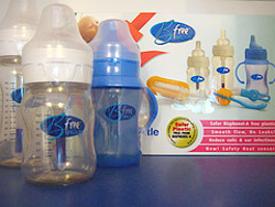 芝加哥市議會近日通過全美第一項自治條例,自2011年1月1日起將革除市售嬰兒奶瓶和鴨嘴瓶中的有毒化學物質「雙酚A」(BPA,又譯「酚甲烷」)。
芝加哥市議會近日通過全美第一項自治條例,自2011年1月1日起將革除市售嬰兒奶瓶和鴨嘴瓶中的有毒化學物質「雙酚A」(BPA,又譯「酚甲烷」)。
雙酚A用途為使塑膠品透明防裂,普遍使用於水瓶、食物容器、嬰兒奶瓶、某些牙齒填充物以及罐裝食物與飲料瓶的內側塗料。
雙酚A類似雌激素,近期研究發現許多雙酚A對荷爾蒙的影響,如前列腺、乳腺,另外也影響胚胎、嬰兒與幼童的發育。
即使美國食品與藥物管理局(FDA)准許使用雙酚A於食品容器,疾病管制局(CDC)的研究發現,95%美國人體內所含雙酚A達到或高出動物實驗中引發異常的量質。
自1997年起,超過100篇研究文獻記錄動物暴露在少許的雙酚A下會受不良影響。這些實驗動物更可能會有流產、前列腺問題以及癌症。研究也指出雙酚A和受試動物的肥胖、不孕與行為改變有關。
然而FDA的雙酚A安全檢驗小組僅只參考由美國化學委員會和客戶群為雙酚A製造商的公司所資助的研究結果。而FDA自己的科學諮詢委員會批評檢驗小組「FDA自認合適的安全邊界是不合適的」。
2009年5月8日,在州長博倫蒂(Tim Pawlenty)簽署同意立法成文後,明尼蘇達成為美國第一個禁止嬰兒奶瓶與鴨嘴瓶使用雙酚A的州。這項法案得到壓倒性的雙黨支持,179人中只有13人反對,影響芝加哥決議日前通過在2011年執行的條例。博倫蒂也簽訂了幼童有毒物質防護法案,建立一個系統來處理幼童產品中的有毒物質問題。
目前,加州、康乃狄克、密西根以及紐約州也都正在審議此法案。
沃瑪爾(Wal-Mart)、Toys-R-Us 和Sears等公司已將含有雙酚A的嬰兒奶瓶下架。稍早全美國六大嬰兒奶瓶製造商宣佈已經不再使用雙酚A或者將會把這些產品下架。而化學藥品製造商Sunoco制定新政策,將不再販售雙酚A作為三歲以下幼童之食物容器與水瓶之用。
2008年10月28日,加拿大成為全世界第一個禁止進口和販售含有雙酚A嬰兒奶瓶的國家。2009年3月加拿大衛生部(Health Canada)關於罐裝汽水的調查研究發現,其中絕大部分被檢驗出雙酚A由容器壁滲入飲料中。
Chicago City Council today passed the nation's first municipal ordinance to protect children's health by eliminating the toxic chemical bisphenol-A from baby bottles and toddler's sippy cups sold in the city as of January 1, 2011.
Bisphenol-A is used to make plastics clear and shatter-resistant, and is commonly found in water bottles, food containers, baby bottles, some dental fillings and the coatings for the inside of cans containing foods and beverages.
BPA mimics the hormone estrogen and recent studies have raised concerns about the hormonal impact the chemical can have on the prostate gland, mammary gland, and reproductive development of fetuses, infants, and children.
While BPA has earned approval by the U.S. Food and Drug Administration for what are called "food contact" consumer products, the Centers for Disease Control and Prevention research has shown that 95 percent of tested Americans have BPA levels at or above those found to cause abnormalities in animals.
Since 1997, over 100 published studies have documented adverse effects in animals caused by exposure to low levels of BPA. Lab animals exposed to BPA have been found to be more likely to have miscarriages, prostate problems and cancers. Studies also link BPA to obesity, infertility and behavioral changes in test animals.
A Food and Drug Administration panel that reviewed the safety of BPA considered only studies funded by the American Chemistry Council and by firms whose clients include BPA manufacturers.
The FDA's own science advisory board criticized the panel's finding, noting that "the Margins of Safety defined by FDA as 'adequate' are, in fact, not adequate."
On May 8, Minnesota became the first state in the nation to ban BPA from baby bottles and sippy cups after Governor Tim Pawlenty signed the legislation into law. The BPA ban passed with significant bipartisan support; only 13 of 179 votes were cast in opposition to the ban, which takes effect January 1, 2011.
Governor Pawlenty also signed the Toxic Free Kids Act, which creates a system to address the problem of toxics in children's products.
Other bills are pending in California, Connecticut, Michigan and New York.
Wal-Mart, Toys-R-Us and Sears are phasing out baby bottles containing BPA. Earlier this spring, the nation's six largest baby bottle manufacturers announced that they have either already eliminated BPA or will phase it out of their product lines. Likewise, chemical maker Sunoco instituted a policy that it will no longer sell BPA to customers for use in food and water containers for children under three years of age.
In October 2008, Canada became the first country in the world to ban the import and sale of baby bottles containing bisphenol-A. In March, a Health Canada study of canned soda pop found the vast majority of the drinks tested contained bisphenol-A that had leached from the containers' linings into the drinks.

